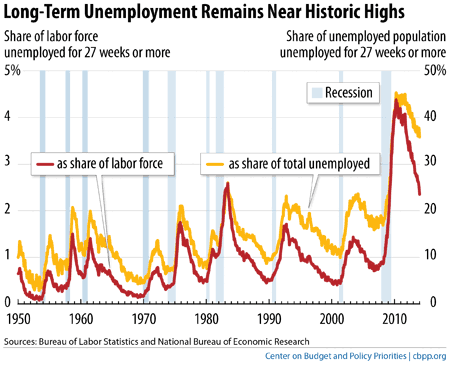BEYOND THE NUMBERS
In Case You Missed It...
This week on Off the Charts, we focused on the economy, the federal budget and taxes, housing, state budgets and taxes, and health reform.
- On the economy, Chad Stone noted that the January employment report offers mixed views of the job market, with employers reporting only modest additions to their payrolls but households reporting large employment gains. We updated our post showing where things stand for the unemployed.
- On the federal budget and taxes, we highlighted Robert Greenstein’s Senate testimony in which he recommended that Congress address two issues in the coming two years: job creation and adequate funding for non-defense discretionary programs. Paul Van de Water explained that generational accounting, a method of comparing the effects of budget policies on people born in different years, is hard to interpret and easily misunderstood. Joel Friedman explained why higher deficits in the new Congressional Budget Office budget forecast don’t reflect higher spending.
- On housing, we excerpted recent House testimony from Robert Greenstein in which he explained that expanding and improving the Housing Choice Voucher program could enhance poor children’s prospects.
- On state budgets and taxes, Elizabeth McNichol showed which states do the best job — and which do the worst — of factoring long-term issues into their budget decisions. McNichol also pointed to Oregon as an example of how states can reap concrete benefits by adopting proven, non-partisan fiscal tools. Chris Mai noted that local school districts have cut hundreds of thousands of jobs over the past few years and the trend is continuing.
- On health reform, Paul Van de Water warned that the “Saving American Workers Act” would make a shift toward part-time employment much more likely. Sarah Lueck explained why it’s far too early to draw conclusions about health reform’s marketplaces. Edwin Park noted that history rebuts the claim that the federal government will renege on its commitment to finance nearly all of the costs of health reform’s Medicaid expansion. Park also described how repealing health reform’s “risk corridors” program would boost deficits and premiums and corrected Paul Ryan’s misleading claim that health reform discourages poor families from working. Chad Stone explained what this week’s oft-cited Congressional Budget Office report really said about health reform and employment.
In other news, we issued a paper on how states are using fiscal planning tools to budget for the future, along with state fact sheets and audio of our media briefing on the report. We also issued Chad Stone’s statement on the January employment report, Robert Greenstein's testimony before the Senate Budget Committee, and a paper on how generational accounting is complex, confusing, and uninformative. Finally, we updated our paper on the 2014 farm bill nutrition title and our chart book on the legacy of the Great Recession.
CBPP’s Chart of the Week:

A variety of news outlets featured CBPP’s work and experts recently. Here are some highlights:
Why It's Wrong to Say Obamacare Kills Jobs
U.S. News and World Report
February 7, 2014
State gets low rank on budget planning
Charleston Daily Mail
February 6, 2014
Most states aren’t very good at planning for the future
Washington Post
February 4, 2014
Battles Loom in Many States Over What to Do With Budget Surpluses
New York Times
February 2, 2014
